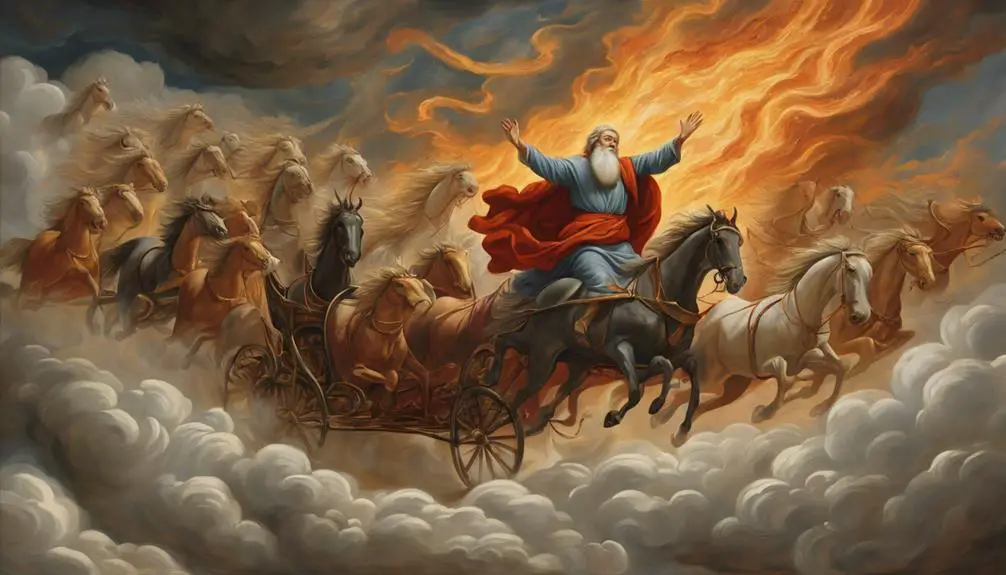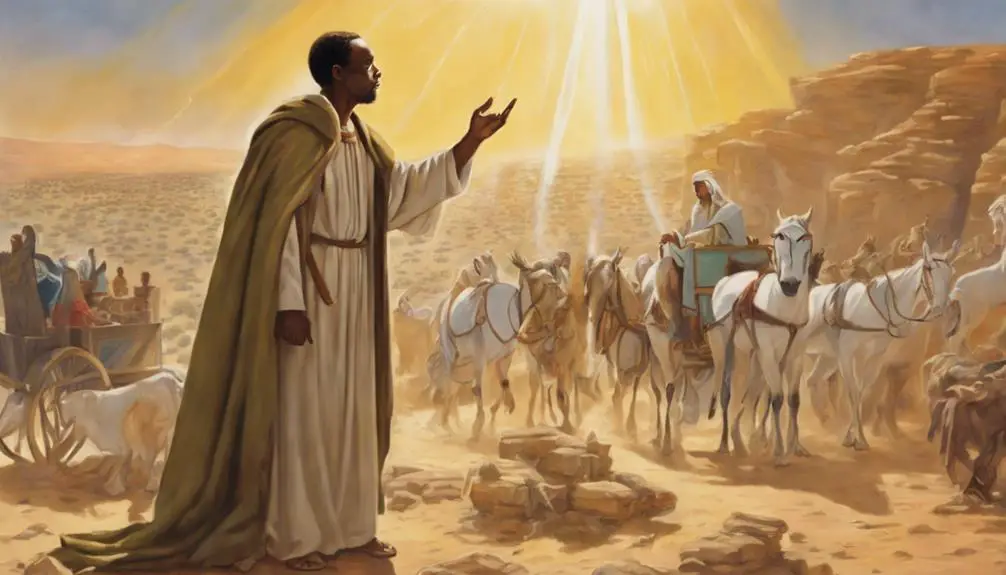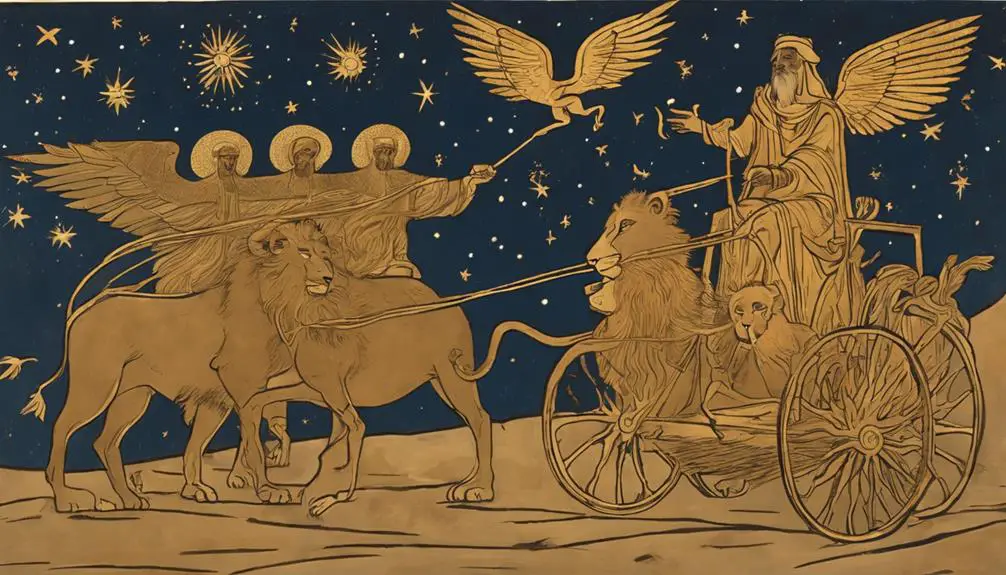Biblical accounts of spiritual transportation reveal a mysterious dimension, enticing readers to explore the divine possibilities of transcendent experiences.

Spiritual Transportation in the Bible
Consider the story of Enoch in the Bible, he simply 'was not, for God took him' (Genesis 5:24). This mysterious statement has fueled centuries of debate among theologians about the nature of spiritual transportation.
From Elijah's chariot of fire to Philip's sudden relocation in Acts, these intriguing accounts suggest a dimension of reality beyond our usual experiences.
How can we understand these events, and what might they tell us about the nature of God, spirituality, and our own potential for transcendent experiences? Just imagine the possibilities.
Key Takeaways
- Spiritual transportation in the Bible demonstrates divine intervention and omnipotence.
- These events symbolize God's control over life, death, and the power to reveal divine truths.
- These biblical transports deepen understanding of mystical spiritual dimensions and divine revelations.
- Such events underscore prophetic authority and the impartation of divine knowledge.
Enoch's Sudden Vanishing

Enoch's abrupt disappearance, as detailed in the scriptures, presents a unique instance of spiritual transportation in biblical history. You'll find that Enoch's longevity is a key element in this mystery. The scriptures record that he lived for 365 years, a remarkably shorter lifespan compared to his antediluvian contemporaries. Yet, it's his Divine disappearance that truly sets him apart.
Enoch didn't die in the conventional sense. Instead, the scriptures declare, 'Enoch walked faithfully with God; then he was no more, because God took him away.' This phrase indicates a non-physical departure from the earthly plane, a concept that's both intriguing and perplexing.
Now, you might wonder, what exactly does this Divine disappearance entail? The text doesn't provide explicit details, but the implication is clear: Enoch experienced a unique spiritual transportation, unseen elsewhere in biblical narratives. It's a compelling testament to Enoch's profound faith and righteousness.
This Divine disappearance underscores the intimate relationship between Enoch and the Divine, a narrative that prompts us to reflect on the nature of faith, righteousness, and Divine encounters. It's a profound testament to the mystical dimensions of spiritual life, as depicted in biblical history.
Elijah's Fiery Chariot Journey

While Enoch's disappearance offers a fascinating glimpse into spiritual transportation, a more visually dramatic example is found in the tale of Elijah, who's said to have ascended to heaven in a chariot of fire. This event, recounted in 2 Kings 2:11, is perhaps one of the most vivid depictions of divine intervention in the Bible.
The fiery chariot, driven by horses of fire, serves as a symbol of God's otherworldly power and majesty. The fire, a common prophetic symbolism, represents God's purifying presence. Elijah's miraculous journey to heaven in this chariot reflects his special status among the prophets. It underscores the belief that he didn't experience death as most do, but was instead directly transported to heaven.
Elijah's ascension isn't just a narrative about a fiery ride to the heavens, but a symbol of his prophetic authority and a testament to divine intervention. The nature of his departure, being taken up into heaven in a whirlwind, is a profound demonstration of the supernatural power of God. This account amplifies the theological concept that God has the ultimate control over life and death.
Philip's Instantaneous Relocation

Turning our attention to the New Testament, you'll encounter another intriguing instance of spiritual transportation in the story of Philip, who, according to Acts 8:39-40, was supernaturally relocated in an instant. This incident, known as Philip's instantaneous relocation, serves as a testament to the Divine teleportation recorded in the Bible.
- The Context: Philip's evangelism was in full swing, as he enthusiastically spread the good news of Christ.
- The Interaction: Philip baptizes a eunuch, an Ethiopian official, who was returning from Jerusalem. Post-baptism, a divine force whisks Philip away, leaving the eunuch astonished.
- The Relocation: Philip finds himself in Azotus, miles away from the baptismal site, continuing his evangelistic journey.
This teleportation, entirely divine in origin, underscores the omnipotence of God, who can manipulate physical laws and barriers. It emphasizes the boundless nature of God's power and His capacity to intervene in human affairs. It's a clear demonstration of the extraordinary lengths He can go to further His message of salvation. Astonishingly, Philip's instantaneous relocation isn't an isolated event in the scriptures, but part of a larger pattern of divine interventions, prominently featuring spiritual transportation.
Ezekiel's Visionary Transport

Diving into the Old Testament, you'll find a striking account of spiritual transportation in the narrative of the Prophet Ezekiel, who, as detailed in Ezekiel 8:1-4, was lifted by the Spirit and transported in a vision to Jerusalem. This prophetic transportation holds significant implications, particularly when it comes to understanding Ezekiel's visions interpretation.
Ezekiel's visionary transport was not just a physical movement, but a spiritual journey. It was a means to reveal divine truths, transcending mere geographical constraints and allowing the prophet to witness the spiritual reality of Jerusalem's corruption.
To further delve into this, let's consider the following table:
Aspect |
Description |
|---|---|
The Vision |
Ezekiel was shown idolatrous practices taking place in the temple, a grim reality that defied the sanctity of the Lord's house. |
The Transport |
Ezekiel's spirit was taken to Jerusalem, indicating a supernatural mode of travel beyond ordinary human capabilities. |
The Role of The Spirit |
The Spirit was instrumental in facilitating Ezekiel's transport, underlining the divine nature of this experience. |
Significance |
This served as a divine revelation meant to convict and awaken the people of Jerusalem to their transgressions. |
In essence, Ezekiel's visionary transport is a profound example of spiritual transportation in the Bible, revealing divine truths and judgments.
Paul's Heavenly Ascent

Shifting our focus to the New Testament, you'll encounter another fascinating account of spiritual transportation with the Apostle Paul's heavenly ascent. This ascent, recorded in 2 Corinthians 12:2-4, is one of the most intriguing Apostolic Visions in the Bible.
Paul's celestial journey can be broken down into three distinct parts:
- The Initial Ascension: Paul describes being 'caught up to the third heaven', a term often used to denote the highest level of heaven where God's presence is fully manifested.
- The Celestial Revelations: During this ascent, Paul hears 'inexpressible things, things that man isn't permitted to tell'. This suggests that God divulged divine secrets to him, showcasing the magnitude of this spiritual encounter.
- The Descent: After receiving these revelations, Paul was returned back to the earthly realm, carrying with him the knowledge that was imparted.
From an analytical standpoint, Paul's heavenly ascent underlines the concept of spiritual transcendence, a key theme in biblical theology. It's a detailed account that highlights the divine-human interaction, significantly advancing our understanding of spiritual transportation in the Bible.
Frequently Asked Questions
How Did the Concept of Spiritual Transportation Evolve Throughout Different Periods in the Bible?"
You're exploring how the idea of spiritual ascensions and divine visions evolved throughout different biblical periods. Initially, they were rare and exclusive to prophets.
Later, the New Testament democratized these experiences, making them more common among believers.
This shift reflects an evolving understanding of spiritual transportation, moving from a secluded, divine revelation to a more accessible spiritual experience.
What Are Some Other Less-Known Instances of Spiritual Transportation in the Bible?"
You're delving into lesser-known instances of spiritual transportation.
Let's consider Ezekiel's Vision: A divine chariot lifted him, symbolizing divine presence and guidance.
Another example is Philip's Teleportation – he was supernaturally moved to another location post baptizing the Ethiopian eunuch.
These instances underscore the theme of divine intervention and mobility. However, they're not as widely acknowledged as other stories due to their complex symbolism and interpretation.
Are There Any Specific Prayers or Rituals Associated With Spiritual Transportation in the Biblical Context?"
In terms of specific prayers or rituals linked to spiritual ascension or biblical visions, there aren't clear-cut examples. You'd find that these profound experiences often occur spontaneously in the scriptures, not prompted by defined rituals.
However, prayer and righteous living are consistently portrayed as prerequisites for divine encounters. So, while there's no 'magic formula', maintaining a prayerful, virtuous life could be seen as the closest thing to a ritual for spiritual transportation.
How Has the Concept of Spiritual Transportation in the Bible Influenced Modern Religious Practices or Beliefs?"
You're exploring how ancient narratives shape modern faiths. Spiritual transcendence, often linked to divine interventions, is a key influence.
In many religions, you'll find practices and beliefs echoing biblical spiritual transportation. This might be prayer techniques aiming for divine connection or doctrines emphasizing life after death.
It's clear these historical concepts continue to mold contemporary religious thought, underscoring our enduring quest for spiritual journeys and encounters beyond the physical realm.
What Are Some Theological Interpretations or Debates Surrounding the Concept of Spiritual Transportation in the Bible?"
When you examine theological interpretations surrounding Ezekiel's Visions and Paul's Conversion, you'll find debates. Some theologians argue these events literally depict spiritual transport, while others view them symbolically. They're seen as either physical transport to divine realms or metaphorical journeys signifying spiritual transformation.
You'll find that these contrasting interpretations greatly influence different denominations' understanding and teaching of these biblical accounts.
Conclusion
You've explored the narratives of Enoch, Elijah, Philip, Ezekiel, and Paul, witnessing spiritual transportation in a biblical context. These events, each unique, underline the omnipotence of a divine entity. They challenge our understanding of physical limitations, stirring profound reflections on spirituality, faith, and the metaphysical.
Thus, these biblical instances of spiritual transportation inspire us to continually seek out and explore the mysteries inherent in our spiritual journeys.



Sign up